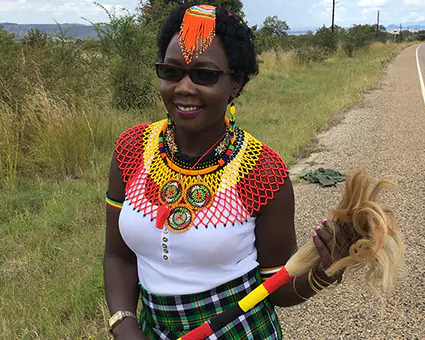
Betty Flora Nakiru
PGR Students
Betty Flora Nakiru joined the University of Greenwich in April 2020 as a full time student for a Four year PhD programme. She previously studied Climate Change and Development at the University of Sussex-United Kingdom and Environment and Natural Resources Management at Makerere University-Uganda with the following qualifications;
BSc Hons Environmental Science-Second Class Lower; MSc Climate Change and Development-Merit
Betty’s research will focus on the perceptions of pastoralists (and their neighbours) of the potential causal linkages between climate variability, conflict of various levels of intensity, and non-climate factors (institutional, political and economic).
As a Karamoja Pastoralist from north-eastern Uganda, she is very passionate about water and environment related issues with over nine years of professional experience in projects implementation and research, including the following:
- June 2017-An ‘In-depth analysis of the mining sector in Karamoja Region, Uganda for Karamoja Development Forum (KDF)
- June to August 2016-Master’s thesis: ‘To what extent are climate risks and associated uncertainty incorporated in Water Resources Management in the Lake Victoria Basin, Uganda?’.
- September 2012- 'Sites Suitability study for Rain Water Harvesting Technologies' as a remedy to floods and drought’ for IUCN-The World Conservation Union, Uganda
- March-2014- 'A Pastoralist-led Rapid Rangeland Health’ Assessment in Karamoja’ for IUCN-The World Conservation Union, Uganda
Primary Supervisor

Professor John F Morton
Professor of Development Anthropology
Thesis Title
Exploring Linkages between Climate Change, Conflict and Food Security in Karamoja, Uganda
Project Description
I aim to explore the linkages of climate change, conflict and food security through an in-depth qualitative study of Karamoja, a pastoral and politically marginalised area of Uganda that has suffered conflicts between pastoralists and between pastoralists and the Ugandan state. Particular attention will be paid to the experiences and perceptions of pastoralists and their neighbours.
Primary research questions will include the following:
- How important are climate change/climate variability and violent conflict within the risk perceptions of the case-study populations, female and male?
- What causal connections are made by pastoralists and their neighbours between climate change/climate variability, violent conflict, and other livelihood stressors?
- To the extent that conflict is seen as a major threat, what strategies are proposed by pastoralists and their neighbours for managing it?
- What qualitative and participatory methodologies are useful in investigating such potential linkages?"
- What are the implications of the findings for larger-scale research initiatives, and for policy-making?
The research is expected to unearth the interrelations among climate change, violent conflict and food security. Hence, help Governments and Academia in policy formulation and informed decision making on how to manage climate change related conflicts in pastoral settings through an integrated approach
- Karamoja Regional Coordinator-Uganda Association of the Sacred Heart Alumna/i
- Trainer/Member-Coalition for Peace in Africa-Uganda Chapter
Betty Flora Nakiru joined the University of Greenwich in April 2020 as a full time student for a Four year PhD programme. She previously studied Climate Change and Development at the University of Sussex-United Kingdom and Environment and Natural Resources Management at Makerere University-Uganda with the following qualifications;
BSc Hons Environmental Science-Second Class Lower; MSc Climate Change and Development-Merit
Betty’s research will focus on the perceptions of pastoralists (and their neighbours) of the potential causal linkages between climate variability, conflict of various levels of intensity, and non-climate factors (institutional, political and economic).
As a Karamoja Pastoralist from north-eastern Uganda, she is very passionate about water and environment related issues with over nine years of professional experience in projects implementation and research, including the following:
- June 2017-An ‘In-depth analysis of the mining sector in Karamoja Region, Uganda for Karamoja Development Forum (KDF)
- June to August 2016-Master’s thesis: ‘To what extent are climate risks and associated uncertainty incorporated in Water Resources Management in the Lake Victoria Basin, Uganda?’.
- September 2012- 'Sites Suitability study for Rain Water Harvesting Technologies' as a remedy to floods and drought’ for IUCN-The World Conservation Union, Uganda
- March-2014- 'A Pastoralist-led Rapid Rangeland Health’ Assessment in Karamoja’ for IUCN-The World Conservation Union, Uganda
Primary Supervisor

Professor John F Morton
Professor of Development Anthropology
Thesis Title
Exploring Linkages between Climate Change, Conflict and Food Security in Karamoja, Uganda
Project Description
I aim to explore the linkages of climate change, conflict and food security through an in-depth qualitative study of Karamoja, a pastoral and politically marginalised area of Uganda that has suffered conflicts between pastoralists and between pastoralists and the Ugandan state. Particular attention will be paid to the experiences and perceptions of pastoralists and their neighbours.
Primary research questions will include the following:
- How important are climate change/climate variability and violent conflict within the risk perceptions of the case-study populations, female and male?
- What causal connections are made by pastoralists and their neighbours between climate change/climate variability, violent conflict, and other livelihood stressors?
- To the extent that conflict is seen as a major threat, what strategies are proposed by pastoralists and their neighbours for managing it?
- What qualitative and participatory methodologies are useful in investigating such potential linkages?"
- What are the implications of the findings for larger-scale research initiatives, and for policy-making?
The research is expected to unearth the interrelations among climate change, violent conflict and food security. Hence, help Governments and Academia in policy formulation and informed decision making on how to manage climate change related conflicts in pastoral settings through an integrated approach
- Karamoja Regional Coordinator-Uganda Association of the Sacred Heart Alumna/i
- Trainer/Member-Coalition for Peace in Africa-Uganda Chapter
